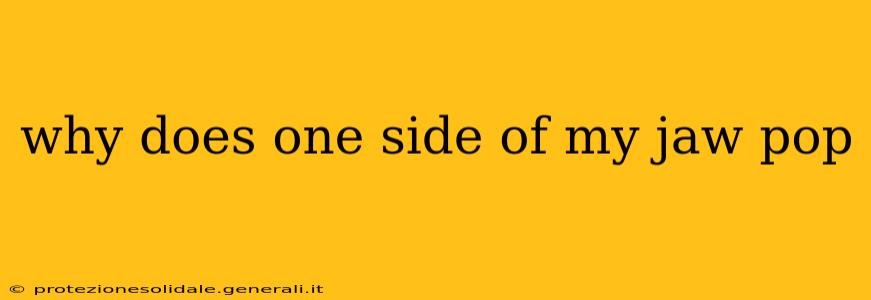Experiencing a popping sensation in one side of your jaw can be unsettling and even painful. This common issue often stems from temporomandibular joint (TMJ) disorders, but other factors can also contribute. Understanding the potential causes and seeking appropriate treatment is crucial for relieving discomfort and preventing long-term problems. This comprehensive guide will explore the various reasons why your jaw might pop on one side, helping you understand your symptoms and take informed steps toward relief.
What is the Temporomandibular Joint (TMJ)?
Before diving into the reasons for jaw popping, it's essential to understand the temporomandibular joint (TMJ). This is the hinge joint connecting your jawbone (mandible) to your skull. It's a complex joint allowing for a wide range of motion, including opening and closing your mouth, chewing, and speaking. Because of this complexity, the TMJ is susceptible to various issues that can lead to popping, clicking, or locking.
Why Does One Side of My Jaw Pop? Common Causes
Several factors can contribute to a popping sensation in one side of your jaw. Let's explore some of the most common:
Temporomandibular Joint Disorders (TMJ Disorders)
TMJ disorders are a leading cause of jaw popping. These disorders encompass a range of conditions affecting the TMJ, its surrounding muscles, and ligaments. Specific conditions include:
- Internal Derangement: This involves a misalignment of the disc that cushions the TMJ. As the jaw moves, the disc may shift, causing a popping or clicking sound. This is often the culprit behind unilateral (one-sided) jaw popping.
- Osteoarthritis: Degenerative changes in the joint cartilage can lead to popping and clicking, as well as pain and stiffness.
- Rheumatoid Arthritis: This inflammatory condition can also affect the TMJ, causing similar symptoms to osteoarthritis, including jaw popping.
Other Potential Causes
While TMJ disorders are frequently implicated, other factors may contribute to jaw popping on one side:
- Ligament laxity: Loose or stretched ligaments in the jaw joint may allow for excessive movement, leading to a popping sound.
- Muscle spasms: Tight or spasming jaw muscles can also cause a popping sensation. Stress, bruxism (teeth grinding), or clenching can exacerbate this issue.
- Jaw dislocation (subluxation): While less common, a partial dislocation of the jaw can cause a popping sound, often accompanied by pain and difficulty opening the mouth fully.
- Trauma: A past injury to the jaw, such as a fall or impact, can sometimes lead to chronic jaw popping.
How Can I Tell if My Jaw Popping is Serious?
It's crucial to differentiate between occasional jaw popping, which might be harmless, and persistent or painful popping that warrants medical attention. Seek professional help if:
- The popping is accompanied by significant pain.
- You experience jaw locking or difficulty opening your mouth.
- The popping is accompanied by headaches, earaches, or neck pain.
- The popping is accompanied by swelling.
- The popping is getting worse over time.
What Treatment Options Are Available for Jaw Popping?
Treatment for jaw popping depends on the underlying cause and severity of symptoms. Options may include:
- Conservative management: This often involves self-care measures like applying heat or ice, over-the-counter pain relievers (NSAIDs), and avoiding foods requiring excessive jaw movement.
- Physical therapy: A physical therapist can teach you exercises to strengthen jaw muscles, improve joint mobility, and reduce pain.
- Splints or mouthguards: These appliances can help realign the jaw and reduce stress on the TMJ.
- Medications: Muscle relaxants, pain relievers, and anti-inflammatory drugs might be prescribed to manage pain and inflammation.
- Surgery: In rare cases, surgery may be necessary to correct severe TMJ disorders.
How Can I Prevent Jaw Popping?
While not all cases of jaw popping are preventable, several strategies can help reduce your risk:
- Manage stress: Stress can contribute to muscle tension and jaw clenching. Practice stress-reducing techniques like yoga, meditation, or deep breathing exercises.
- Improve posture: Poor posture can strain the jaw muscles. Maintain good posture while sitting, standing, and sleeping.
- Avoid chewing gum excessively: This can put extra stress on the TMJ.
- Eat soft foods: When experiencing jaw pain, opt for soft foods that require less chewing effort.
- Practice gentle jaw stretches: These can help improve flexibility and reduce muscle tension.
Remember, this information is for general knowledge and doesn't constitute medical advice. If you're experiencing persistent jaw popping or other concerning symptoms, consult a dentist, oral surgeon, or other healthcare professional for a proper diagnosis and treatment plan. They can accurately assess your specific situation and guide you toward effective relief.
